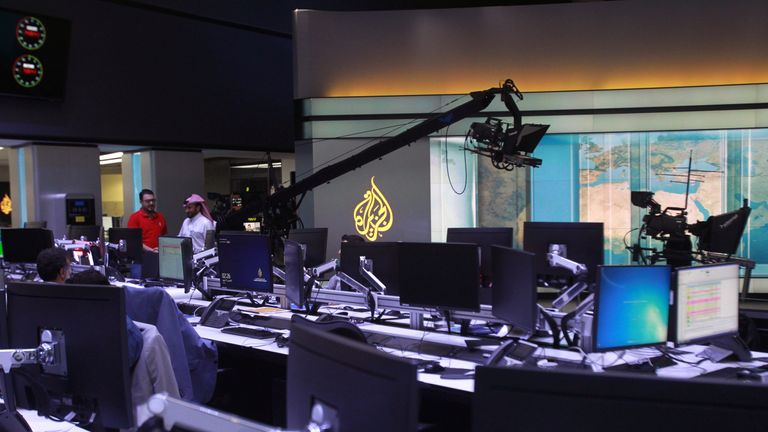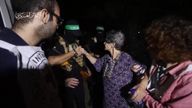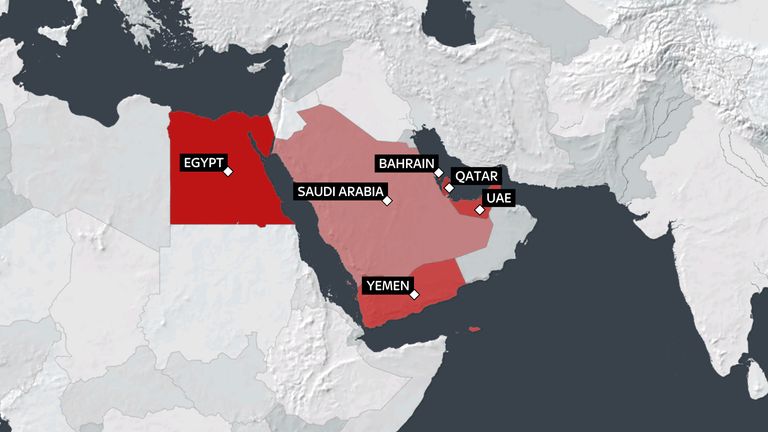Qatar-based TV channel Al Jazeera 'hit by cyberattack'
The broadcaster is at the centre of a diplomatic crisis that has exploded between Doha and five Arab countries.
Thursday 8 June 2017 21:31, UK
Qatar-based TV channel Al Jazeera has claimed all its systems, websites and social media accounts have been hit by a cyberattack.
The company said it was experiencing "systematic and continual hacking attempts" which were "gaining intensity and taking various forms".
But a senior employee told the Reuters news agency the international broadcaster is "combatting" the onslaught and all its systems are still "operational".
Hours after Al Jazeera's claim, Qatar's separate state-run TV broadcaster said it had shut down its website temporarily "for security reasons" after hacking attempts.
The reported cyberattack on Thursday comes as Al Jazeera is at the centre of Qatar's row with fellow Arab states over allegations the country supports terrorism.
Al Jazeera is owned by Qatar's government and funded by the Gulf state's ruling Al Thani family, prompting accusations it is used as a key pillar of the country's foreign policy.
The broadcaster has often proved an irritant to its fellow states in the region, with Egypt, Saudi Arabia, the United Arab Emirates (UAE) and Bahrain - leading actors in the ongoing diplomatic crisis - all blocking Al Jazeera's website in their countries last month.
The four countries, as well as Yemen, this week accused Doha of destabilising the region by backing extremist groups, including Islamic State.
In a co-ordinated move, the five states broke off diplomatic ties with Qatar and halted all land, air and sea traffic to the country.
Qatari citizens living in any of the five territories have been given two weeks to leave.
It has been suggested Qatar's neighbours could demand the complete shutdown of Al Jazeera as part of a resolution to the crisis.
The broadcaster's offices have previously been closed in Saudi Arabia and Jordan while Egypt has imprisoned Al Jazeera journalists.
Arab governments have been angered by the air time Al Jazeera has given to Islamist groups in countries such as Syria and Libya. The channel has also hosted guests hostile to other countries' rulers.
On Thursday, Al Jazeera's acting director-general Mostefa Souag dismissed claims the broadcaster is interfering in the affairs of neighbouring countries, while Qatar has denied the claims it supports terrorist organisations.
The gas-rich state's foreign minister Sheikh Mohammed bin Abdulrahman Al Thani declared on Thursday the country is "not ready to surrender" amid the crisis.
He said: "We have been isolated because we are successful and progressive. We are a platform for peace not terrorism.
"This dispute is threatening the stability of the entire region.
"We are not ready to surrender, and will never be ready to surrender, the independence of our foreign policy."
Despite the growing tensions, he insisted "there cannot ever be a military solution to this problem".
He also defended Qatar's right to support groups such as the Muslim Brotherhood, despite it being banned in other Arab nations, and claimed the country is "not worried" about a food shortage due to its isolation.
The closure of Qatar's only land border, with Saudi Arabia, has raised fears of the country running out of supplies for its 2.7 million people, with long queues forming at supermarkets which are struggling for food stock.
Meanwhile, Turkey's parliament has approved a bill allowing the country to base more troops in Qatar in an apparent show of support.
The move sparked accusations Doha was heightening the crisis by seeking help from Turkey and Iran, the biggest adversary of Saudi Arabia and its allies.
Anwar Gargash, the UAE's foreign affairs minister, claimed "the great escalation" from Qatar could result in "a new tragic and comic chapter".





